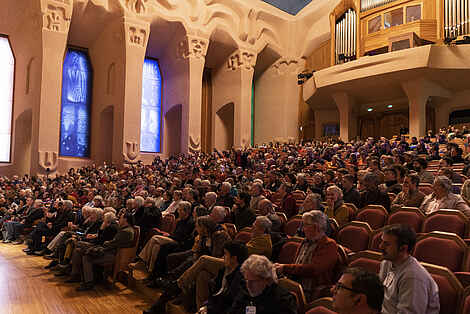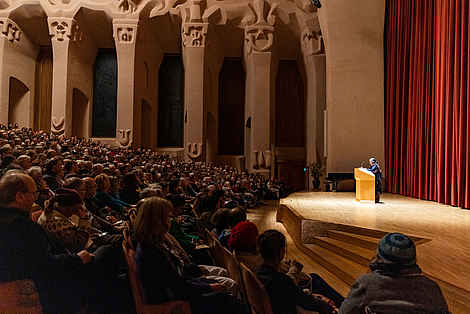This year's Agriculture Conference at the Goetheanum had a very special mood. Was it the joy of meeting in person again after two years of conferences that only happened online? Was it the presence of many young people and women? At the end of this meeting there were many smiling faces and a great sense of thankfulness amongst those present: around 550 in-person participants, roughly the same number online and seven regional groups (China, Taiwan, Malaysia, the Philippines, Africa, Argentina and Ukraine) that organised a hybrid conference in their respective countries. When money is tight and travel is difficult, then new ways have to be found to maintain a sense of connection. The conference had depth and seriousness as well as a mood of lightness and tolerance, qualities that are perhaps a mark of the maturity of this almost centenarian movement.
The culture of agriculture
The first theme of the conference was the review of the development of agriculture itself. Perhaps we should actually speak of "agri-culture". As Vandana Shiva and Martin von Mackensen described, in the beginning agriculture was in fact a culture (we could even say a cult) – in other words, it arose from a new relationship of human beings to the sacred and to Mother Earth. In Göbekli Tepe in Turkey there are traces of this new attitude, where human beings actively placed themselves in the vertical dimension.
Vandana Shiva also demonstrated that, everywhere in the world, the original culture has now been separated from its sacred and cultural aspects in order to reduce agriculture to mere industry for the production of commodities. This allows a few giant companies to acquire land, seed, fertiliser and now even the farmer's expertise in order to sell it as something new via digital apps. Many farmers now have a great longing to rediscover this sacred or cultural quality. As Helmy Abouleish from Sekem (Egypt) and Maaianne Knuth from Zimbabwe showed, for many farmers in the world, the biodynamic approach can unite with cultural tradition in order to develop a worthy agriculture of the future.
Cosmos, earth and atmosphere
The introductory morning presentations by the two farmers Albrecht Römer and Werner Michlits showed additional facets of this search for the spiritual in the human being via three steps, following this memorable sentence by Rudolf Steiner: "The Sun-nature which for long periods man received only from the Cosmos, will begin to shine within his soul."* In other words, at the beginning of agriculture, the wisdom that was experienced as being given by the gods – for instance, in many world cultures it is said that the gods gave humankind the crop plants – can now awaken in each of us if we actively seek this. The trio of contributions that followed, given by Sherry Wildfeuer, Tom Saat and Jean-Michel Florin, each showed in a very personal way how it is possible to develop this kind of new and free relationship to the cosmos and the world of the stars, to the earth and especially to the fertile soil and the atmospheric landscape surrounding us, in order to develop an agriculture in keeping with its essential nature.
99 years
A second theme was the review of the varied facets of the history of biodynamics since its foundation in Koberwitz in 1924. A number of reports described the innovative capacity of the biodynamic community: the founding of the first biological research institute at the Goetheanum by Ehrenfried Pfeiffer in 1924, the first organic brand Demeter collectively owned by farmers in the 1930s, the founding impulse for the environmental movement through the book "Silent Spring" by Rachel Carson, who was inspired by two of her friends involved with biodynamics, etc.
Short presentations on the history of the development of biodynamics in different countries such as Turkey and Great Britain – where a methodologically first class study was undertaken on understanding the nature of British biodynamic agriculture –, Poland, Lithuania and Spain showed how biodynamics developed with the culture of each country. There were sometimes obstacles – for instance the period marked by Soviet rule (from 1945 to 1990) meant a complete standstill in Poland and Lithuania – and sometimes rapid developments, such as is happening right now in Spain, where interest in biodynamics is growing exponentially.
Individual stories
A further highlight was the panel "Women as pioneers in biodynamics", which brought attention to the often unnoticed importance of the work of women in the past, and also touched on more subtle aspects such as the dimension of individuality. The lecture by Ueli Hurter on matters of destiny in the biodynamic movement was a successful expansion of the question of individuality touched on by the panel, something that is so important for biodynamics. Ueli Hurter then posed the following question on the three dimensions of the biodynamic movement (those of the individual, the movement and humankind in relation to the earth). How is what we see and experience an expression of larger interrelationships that go beyond the individual life, the individual person and a specific situation in time? This is an important expansion of the view of the history of biodynamics!
The Saturday closed with a lecture by Peter Selg about a significant aspect of the life of Rudolf Steiner that can help in answering a question that often arises: did Rudolf Steiner discover all his knowledge of plants and the secrets of nature himself? It is very interesting to learn how his meeting with the simple herb gatherer, Felix Kogutzki, was of such importance for his developmental path.
It is almost impossible to do justice to the amazing diversity of what was on offer at the Agriculture Conference. There was art of various kinds, for instance with excellent eurythmy artists but also very successful musical improvisations and a great many courses, including discussion workshops, meetings and presentations on various topics in the Open Spaces, as well as exhibitions. In addition, we should not forget the impromptu meetings that are often important in life for discovering new things.
Conclusion
Looking back at the conference we can say that this biodynamic event showed very clearly how art, science and practical experience can combine and offer mutual support in order for a true agriculture or culture of the living to continue to develop. Biodynamics is therefore able to make us aware once more of the dignity of working with the spiritual on earth.
The next Agriculture Conference will take place from 7-10 February 2024 on the topic "100 years of the Agriculture Course"
* Rudolf Steiner: Anthroposophical Leading Thoughts, GA 26

